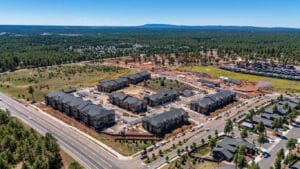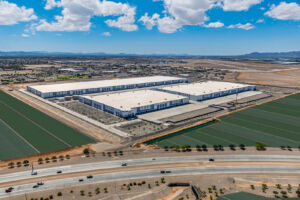In Arizona, referendum laws are designed to empower citizens by allowing them to challenge legislative decisions through a public vote. However, in recent years, these laws have been increasingly misused as a tool to block zoning changes and halt new developments. This trend has raised concerns among city planners, developers, and zoning attorneys that referendum laws are being weaponized to obstruct economic development rather than serve as a check on government power.
MORE NEWS: Construction begins on $326 million North 2 Concourse in Terminal 3
INDUSTRY INSIGHTS: Want more news like this? Get our free newsletter here
Understanding Arizona’s Referendum Laws
Arizona’s Constitution grants voters the right to challenge legislative decisions through referendums. If enough signatures are gathered, the issue is placed on the ballot for a public vote. While this process is meant to ensure democratic participation, it has been increasingly exploited in ways that hinder new development and economic growth.
Traditionally, zoning cases are considered legislative actions and thus subject to referendums. However, special interest groups have used referendum petitions to delay or completely derail development projects when the proposed project does not bow to their demands.

How Referendum Law Is Being Misused
Many cities in Arizona rely on zoning amendments to accommodate growth. Opponents of development projects have used referendums to challenge these changes, even when they align with city planning goals. This misuse creates uncertainty for developers and can stifle economic investment. By blocking necessary zoning changes, they think they can bend the developer to their will.
Second, they seek to delay or kill development projects. By forcing zoning decisions to a public vote, opponents can delay projects for months or even years. In many cases, developers abandon projects due to financial uncertainty, even if the zoning change is eventually upheld. This tactic is often employed by groups resistant to change, whether due to concerns about density, traffic, or property values.
Third, they abuse the legal purpose of the referendum (to empower citizens) to force their special interest wishes (unionize workers). Arizona courts have seen numerous cases where referendum petitions challenge zoning changes. The legal tool emboldens opposition groups to use referendums as a delay tactic, knowing that the litigation process itself can be enough to derail projects, and force development to succumb to their demands.
Notable Cases: VAI Resort, Axon Headquarters, and Union Involvement
High-profile projects in Arizona—VAI Resort in Glendale, Axon’s new corporate headquarters in Scottsdale, and other major developments—have become entangled in referendum battles, largely due to efforts by Worker Power, a labor-backed group.
- VAI Resort: Billed as an entertainment-driven destination, VAI Resort is set to become the largest resort in Arizona, featuring hotels, an entertainment district, and the Mattel Adventure Park™. However, opponents led by Worker Power challenged the zoning changes necessary for the project, citing concerns about the environmental impact. Perhaps telling of the true motive, no Glendale residents raised this concern during the dozen meetings and hearings on this project. In fact, public opposition was virtually non-existent during the entire zoning case. With these concerns at the end of the day, the referendum effort is primarily a pressure tactic by labor groups to unionize rather than a grassroots movement against the project itself.
- Axon Headquarters: The Scottsdale-based public safety technology company, Axon, faced significant pushback when planning its new headquarters. The development required zoning modifications to accommodate its expansion, but Worker Power and its allies leveraged a referendum to stall the process. The move was widely seen as a strategy to extract labor concessions rather than an effort to address legitimate community concerns.
- Union Influence on Referendums: Worker Power and affiliated labor organizations have increasingly used referendum petitions as a tool to pressure developers into negotiating with unions or adopting labor-friendly policies. It’s also no surprise this same great force was behind the effort to stop the Phoenix Coyotes from relocating to Tempe.
While unions play an important role in advocating for worker rights, their use of referendum laws in this way has led to unintended consequences, including stifling economic growth and delaying much-needed housing and commercial projects and reducing/limiting the number of high-paying jobs in the area. These cases illustrate how referendum petitions are being weaponized to slow or block projects that have already been approved through standard zoning procedures.
The Consequences of Referendum Abuse
These abusive practices stunt economic growth. When developments are delayed or canceled, cities lose out on huge economic drivers, job opportunities, housing supply, and tax revenue.
It also leads to government inefficiency. Cities spend time and resources defending zoning decisions in court instead of focusing on proactive urban planning.
This practice ultimately leads to increased costs for developers and consumers. When referendums are used as leverage in labor negotiations, the costs of projects rise, which can lead to higher prices for housing, goods, and services. City’s lose out as well, since the tax revenues from this project could have supported other city services and programs.
Conclusion
Arizona’s referendum law was designed to empower voters, not to serve as a tool for obstructing growth. While public participation in development decisions is important, the misuse of referendum petitions to challenge zoning changes is creating legal chaos, stifling economic development, and worsening the state’s housing crisis.
The cases of VAI Resort, Axon’s headquarters, and the broader involvement of Worker Power demonstrate how these tactics can threaten even the most promising projects. Addressing these issues through legislative and judicial clarity is essential to ensure that Arizona continues to grow in a sustainable and efficient manner.
Author: Adam Baugh is a land use and zoning attorney and partner at Withey Morris Baugh PLC.




